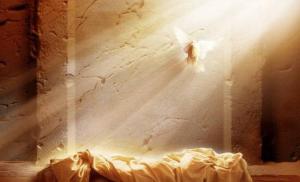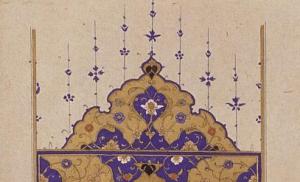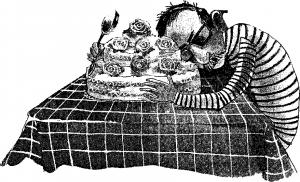Annunciation of the Blessed Virgin Mary. Feast of the Annunciation of the Blessed Virgin Mary: history, signs, traditions
Ancient written sources about Her life are unknown, and all information about the Virgin Mary is drawn from oral tradition that existed in the first Christian communities.
This legend claims that the Virgin Mary came from the family of David and was the daughter of the pious Joachim and Anna. The girl was a late child, given to them by the Lord at a very advanced age through their fervent prayers, and therefore her parents perceived Her birth as a great miracle and the mercy of God. Following Jewish custom, they decided to dedicate Her to God. In those days, many children were brought up at the temple, and as they grew up, they bore certain responsibilities and obediences here. At the age of three, baby Mary ascended the steps of the Jerusalem Temple, committing herself to the mercy of God.
We know nothing about the early life of the Virgin Mary. Having reached a certain age, She was betrothed to an elderly man named Joseph, a carpenter from the Galilean city of Nazareth. Joseph was not Mary's husband, but the betrothed and guardian of Her virginity, for a girl dedicated to God was supposed to remain in purity and chastity.
Speaking about the fact that for the salvation of the human race God chose a special means - God-manhood, we have previously emphasized that in this means two principles seem to be combined. First of all, this is the Divine presence and Divine omnipotence, for only in the power of the Creator was it possible to put a limit to action original sin, returning to humanity the grace that comes from the Heavenly Father. Another component of salvation is the free will of man himself, for without his effective participation in the atonement of sin, salvation would not have the dignity of a voluntary choice. It was extremely important that the descendants of Adam and Eve responded with their hearts to the call of God, answering Him: we agree to receive the salvation bestowed by You, and are ready to participate with You in this mystery. Such consent was pronounced by the Virgin Mary on behalf of the human race.
This event is called the Annunciation - in Greek “Evangelismus”, that is, “Good News”. This is what the Gospel of Luke tells about the circumstances of the Annunciation:
“The angel Gabriel was sent from God to a city of Galilee called Nazareth, to a virgin betrothed to a husband named Joseph, from the house of David; The name of the Virgin is: Mary. The angel, coming to Her, said: Rejoice, full of grace! The Lord is with You; Blessed are You among women. She, seeing him, was embarrassed by his words and wondered what kind of greeting this would be.
And the Angel said to Her: Do not be afraid, Mary, for You have found favor with God; and behold, you will conceive in your womb and give birth to a Son, and you will call His name Jesus. He will be great and will be called the Son of the Most High, and the Lord God will give Him the throne of His father David; and He will reign over the house of Jacob forever, and His kingdom will have no end.
Mary said to the Angel: How will this be when I don’t know my husband? The angel answered Her: The Holy Spirit will come upon You, and the power of the Most High will overshadow You; therefore the Holy One who is to be born will be called the Son of God. Here is Elizabeth, Your relative, who is called barren, and she conceived a son in her old age, and she is already in her sixth month, for with God no word will remain powerless.
Then Mary said: Behold, the Servant of the Lord; let it be done to me according to your word. And the Angel departed from Her"(Luke 1:26–38).
These words: “Behold, the Servant of the Lord; “Let it be done to Me according to Your word,” not only express the meek readiness of the Virgin Mary to accept what was announced to her by the Angel, but are also a formula for the consent of the human race to collaborate with God in the matter of salvation.
This consent of the Virgin Mary should not be taken as a restriction of the freedom of people by Her personal will. Indeed, the Virgin Mary appears before God on behalf of the entire human race. However, the consent given by Her cannot be considered as an attack on someone’s freedom, for everyone who freely accepts Christ becomes an accomplice in the saving Divine action personally, of their own will and through their own effort. Thus, in the event of the Annunciation our own freedom of choice is realized.
It is also known that some people are skeptical about the miracle of seedless conception by an inexperienced Virgin. From the point of view of science and our human experience seedless conception seems impossible. But God is the Creator of the world with its physical laws, and therefore what is impossible for us is not impossible for Him. In this sense, our knowledge and ideas are conditional: when we say that something cannot exist, we proceed from ideas and reality that are natural to our human world. But, as Saint Andrew of Crete beautifully expressed it in his Great Penitential Canon, “Where God wills, the order of nature is overcome: He does as He wills” (Theotokos, 4th Canto).
Our attitude towards the Annunciation, towards the immaculate conception of the Son of God by the Most Holy Virgin, should be characterized by one word: reverence. We should reverently believe that the Mother of God, according to Saint Ambrose of Milan, remained a Virgin even after she conceived in the womb, and remained a Virgin after she gave birth. This is the faith of the Church. As St. John Chrysostom says, “The Holy Spirit shone in a pure mirror, in the immaculate body of the Virgin, forming a perfect Man not according to the law of nature... not from human seed, but... inexplicably searching for the Embryo in her, like some kind of tissue, for the salvation of people.”
The great Divine secret hidden here does not reveal itself either in the human mind, or in knowledge, or in the imagination. It is possible to become a participant in it only through the power of faith, for the content, meaning and reality of this mystery are revealed to us in religious experience.
The Annunciation of the Blessed Virgin Mary in the Holy Gospel begins with the mention that miraculously in her old age she conceived a child - the future prophet John the Baptist.
And the sixth month has already passed since this extraordinary event took place, similar to the miracle that happened in ancient times to the righteous Abraham and Sarah.
“In the sixth month the angel Gabriel was sent from God to a city of Galilee, called Nazareth, to a virgin betrothed to a husband named Joseph, from the house of David; and the name of the Virgin is Mary” (vv. 26–27).
The tradition of the Jerusalem Church indicates two places of the Annunciation - the first and second appearance of the Angel to the Virgin Mary. The first place is the source to which She usually went. It was located at a distance, and the Mother of God visited this particular source so as not to encounter or communicate with other women and, thus, not to indulge in idle talk and not to be scattered...
And so the Archangel Gabriel first appeared to Her at this source (in the Gospel this detail is omitted, perhaps for the sake of brevity), and said: “Rejoice, full of grace! The Lord is with You; Blessed are You among women” (v. 28).
The Mother of God was struck by this vision - not by the appearance of an Angel, because during Her stay in the Temple of the Lord in Jerusalem they appeared to Her, as the Holy Fathers tell, every day and brought heavenly food, but by his address: “Rejoice, full of grace.” As a completely humble person, the Mother of God did not understand why She should stand out among other people and why She, who took a vow of virginity, is blessed among wives?
Perhaps She guessed that the expression “blessed among wives” should refer to women blessed with the fruit of the womb - children, and considered the words “Rejoice, Blessed One! The Lord is with You” are too meaningful. Of course, the Lord is with every person who pleases Him, but here, together with the words “Blessed are You among women,” the greeting “The Lord is with You” sounded somehow special. Confused by this, as it seemed to Her, an inappropriate greeting for Her - for humility does not accept any praise - She remained in some thought.
The angel cried: With fear, as a servant of the Lady, I stand before You,/ with fear, O Maiden, now I am ashamed to look at You,// as if the rain fell on the fleece, the Word of the Father will descend upon You, as it is favored.
Having collected water from the source, the Virgin returned to the house of the righteous Joseph. This house has survived to this day - it is located under the roof of a huge catholic church, built in a modern style (in ancient times, all the shrines of Palestine belonged to the Orthodox Greeks, but after various historical disasters, some holy places began to belong to other faiths). And now in the house the Angel again appeared to the Blessed Virgin and explained why She is blessed among wives and what this extraordinary expression “The Lord is with You” means.
“And the Angel said to Her: Do not be afraid, Mary, for You have found favor with God; and behold, you will conceive in your womb and give birth to a Son, and you will call His name Jesus. He will be great and will be called the Son of the Most High, and the Lord God will give Him the throne of His father David; and he will reign over the house of Jacob forever, and his kingdom will have no end” (vv. 30–33).
The Mother of God did not doubt that the Messiah should come into the world, that He was the son of David and would reign over the house of Jacob forever, but She was confused by only one thing: that She should become the mother of Christ. She did not imagine that any change should occur in Her destiny, and did not want to give up the vow that she made to God while staying in the Holy of Holies: to serve only Him alone with prayer and not to think about anything earthly, or about any greatness, glory or honor.
She wanted, in obscurity and solitude, to constantly pray for the salvation of the Israeli people and all humanity, for the coming of the Savior into the world, for She understood that only Christ could save “His people from their sins” (Matthew 1:21). And therefore the doubt She expressed expressed bewilderment only in relation to this. “Mary said to the Angel: How will this be when I don’t know my husband?” (v. 34).
“The angel answered Her: The Holy Spirit will come upon You, and the power of the Most High will overshadow You; therefore the Holy One who is to be born will be called the Son of God. Here is Elizabeth, your relative, who is called barren, and she conceived a son in her old age, and she is already in her sixth month, for with God no word will fail” (vv. 35-37). What does it mean that the Holy One who is to be born will be called the Son of God? “It will be called” does not mean that it will simply be called, as we sometimes call a thing or person with one or another arbitrary name.
For example, parents want to give the child a name, and some family members want to call him Sergei, others - Alexander. But none of these names has any significant relation to what a person is; giving a name does not change anything about him, and it is given rather for convenience or to console the parents.
Here the name corresponds to the essence of the Born. “He will be called the Son of God” means he will truly be called, for He will truly be the Son of God, born miraculously by the inspiration of the Holy Spirit, by the power of the Most High.
Second Person Holy Trinity– The Son of God, according to the Eternal Council, which existed even before the creation of the world and man, had to descend from heaven at a certain time, put on human nature, and appear as a man. The Monk John of Damascus boldly and sublimely says that in the conception of the Divine Child by the Virgin, the Hypostasis of the Son of God was instead of the male seed.
Thus, two natures were united in one Hypostasis: human, which was taken from Holy Mother of God, and Divine, naturally united with the Hypostasis of the Son of God. Because of this sacred conception, the like of which has never been or ever will be, there was in the Lord Jesus Christ no sin transmitted through ordinary human conception.
Human nature in the Lord Jesus Christ was perfect in the sense that it had all the fullness of human nature: mind, soul, body, ordinary human properties, action, will - everything except sin. However, at the same time, she did not possess her own human hypostasis, or, speaking modern language, had no personality of her own. In Jesus Christ there were two natures with all their properties, but one personality - the Personality of the eternal Son of God.
The divine nature in the Lord Jesus Christ, after His incarnation, could not lose any of its properties. By saying that God came to earth, we are only condescending to our limited human mind, for God is omnipresent. By saying “descended to earth,” we express that He was invisible to us, residing in some distant spiritual spaces, but now appeared as a man. He retained all His Divine properties: omniscience, immortality, omnipresence, goodness and others, known and unknown to us.
The Son of God took upon Himself our human nature, just as one takes a wounded or sick person onto the shoulders, wanting to save him from imminent death, and carries him into the house to heal him there.
Having united with us, the Lord Jesus Christ lifted onto the Divine shoulders the human nature He borrowed from the Virgin Mary and raised it to God the Father. He sanctified everything that was desecrated by the Fall: the mind, the soul, the body, and all human properties, because if something had remained in a person outside of this Divine perception, then it would not have been purified and redeemed.
The work of our salvation began with the event of the Annunciation
What was promised to Eve as a consolation after our first parents sinned by disobedience, lost grace and lost communion with God, happened on the day we remember today. Once upon a time, extraordinary, incomprehensible, even strange words were spoken to Eve: “The seed of the woman will erase the head of the serpent” (see Gen. 3:15).
How to understand the “seed of the wife” if only the husband can have the seed and in ancient biblical genealogies the origin of people was always indicated along the male line? But this extraordinary event, predicted in ancient times, actually happened. The “seed of the woman” was supposed to trample on the “head of the serpent” - the devil.
“The seed of the woman” - because there was no seed of the husband, for the Virgin Mary conceived without a husband. She conceived miraculously, which cannot be called conception in the sense of the word in which we all understand it.
Our Lord Jesus Christ, with His glorious birth, and then with His entire life, especially with his preaching and suffering on the Cross, redeemed human nature. Since it was unhypostatic, hypostaticized into the Hypostasis of the Son of God, then not just any individual Jesus, but all human nature was redeemed in this way.
Each of us has a nature allocated, so to speak, to himself, and in general our nature exists in specific hypostases, or personalities. Therefore, it cannot be said that there is “man in general.” The human nature of the Lord Jesus Christ did not have its own human hypostasis. And therefore He can be called an all-man, that same “man in general,” and not just an individual human being.
Thus, the Savior redeemed all humanity from the Fall and defilement.
The main thing of our salvation
The days of Passion Week are already close, when we will remember the suffering of the Lord and His accomplishment of the work of our redemption through His extraordinary, incomprehensible, even impossible for us, obedience. Our forefathers, having violated the lightest commandment, boldly stretched out their hand to the tree of the knowledge of good and evil, ate the forbidden fruit, and through this active disobedience, committed not only in mind, but also in deed, they lost communication with God and were subjected to punishment - expulsion from paradise and everything everything else that followed the Fall.
Our Lord Jesus Christ fulfilled the commandment of obedience to the end, “even to death” (Phil. 2:8). He was obedient to God the Father to such an extent that He allowed His hand to be nailed to the cross in order to heal the hand of man that had once boldly reached out to the tree of knowledge. He gave His feet to suffer, because in paradise the feet of man rush to fulfill a criminal desire.
Being sinless, the Savior in Himself punished everything human on the Cross. Instead of the forbidden fruit, He tasted vinegar with gall and, innocent, drank the cup of punishment to the bottom, voluntarily making Himself guilty for our guilt. He did what we should have done, and for this he chose the most difficult method, impossible for any person. With His Divinity united with humanity, He purified human nature and offered it as an immaculate sacrifice to God the Father.
The just punishment to which all people, without exception, were subjected for disobedience, suddenly in one case - in relation to the God-man Jesus - turned out to be undeserved, and the indisputable law according to which we were subject to this punishment was abolished, because in this case it also turned out to be unfair. But we will reflect on all this during Holy Week. Now we remember where our redemption began: the incarnation of the Son of God, His assumption of human nature, His appearance into the world as a man.
Hearing the words of the Archangel Gabriel: “No word will remain powerless with God” (v. 37), the Blessed Virgin said: “ Behold, the Servant of the Lord; let it be done to me according to your word"(v. 38). What is impossible and incomprehensible to man is realized through the action of the One who created the world from nothing and now gives existence to everything that exists. As the liturgical hymns and divine hymns of the Orthodox Church explain to us, Archangel Gabriel at that time contemplated with reverent horror the influx of the Holy Spirit onto the Virgin Mary and the formation in Her womb of the body of the Infant Christ. “And the angel departed from her” (v. 38).
Thus was accomplished the mystery of the incarnation of the Son of God, the remembrance of which in Orthodox liturgical usage is called feast of the Annunciation.
There has never been an event like this and there never will be. One is the God-man Christ, in whom humanity was united with the Divine Hypostasis, and there will never be others. That is why we are amazed and horrified by this miracle. In people who are alien to the action of grace, this amazement is a reason for unbelief, because faith comes from grace, and not from our own efforts. And from amazement at this miracle, we come to a feeling of deepest, ineffable gratitude to our Creator and Savior.
Each Divine Liturgy is, first of all, an expression of our gratitude to God, as far as it can be conveyed in human words, thoughts and feelings. We often call the Liturgy, which means “public service,” the Eucharist, which means “thanksgiving” in Greek.
We must, brothers and sisters, day and night, every moment thank God and rejoice with tenderness and tears that He called us to salvation and gave us faith in the Lord Jesus Christ, incarnate of the Blessed Virgin. Even when we repent and experience a feeling of deep contrition and sadness for sins, then in this sadness there is thanksgiving to God.
After all, if a person were only sad and did not have some mysterious consolation in his soul, then, perhaps, it would be impossible to remember the sins he had committed without fear. And when we experience certain everyday difficulties, inevitable and seemingly hopeless sorrows, then we should also thank the Lord.
Unlike people alien to the Church, who have no hope in their sorrows, we always have something to hope for and something to console ourselves with. Therefore, as we celebrate today’s holiday, let us be filled with a feeling of the greatest gratitude and let us glorify God not so much with words as with our actions and patience with mental and physical sorrows, and through devoted service to the Lord until the end of our days we will glorify Him for his ineffable mercy towards us. Amen
Annunciation of the Blessed Virgin Mary and the Ever-Virgin Mary - so Christian Church names the great twelfth holiday, dedicated to the memory of the Archangel Gabriel’s announcement to the Virgin Mary of her upcoming birth of Jesus Christ. The general meaning of the word “Annunciation” is good, joyful, good news, celebrated (March 25, old style). This sacred event took place, according to church tradition, in the sixth month after the conception of the holy prophet John the Baptist by the holy righteous Elizabeth.
Icon Image of the Annunciation of the Blessed Virgin Mary and the Ever-Virgin Mary
History of the feast of the Annunciation of the Blessed Virgin Mary and the Ever-Virgin Mary.
The Most Holy Virgin Mary was given to her elderly parents, the righteous Joachim and Anna (September 9/22) for their unceasing and tearful prayers. Upon reaching the age of 14, when, according to Jewish law, Her stay in the temple should have ended, Holy Mary was betrothed to the righteous eighty-year-old elder Joseph, a poor carpenter from the family of David, who was entrusted with guarding Her virginity. Having moved to Nazareth, to the house of her Betrothed, Elder Joseph, the Most Holy Mary continued the same life that she spent in the temple.
The Holy Fathers of the Church - Athanasius the Great, Basil the Great, John of Damascus - indicate that, under the guise of marriage, the Lord protected the Blessed Virgin Mary from the malice of the enemy of the human race, the devil, thus hiding from him that She was the very Blessed Virgin about whom he spoke prophet Isaiah: “Behold, the Virgin will be with child and give birth to a Son, and they will call His name Immanuel, which means God is with us” (Matthew 1:23; Isaiah 7:14).
While staying in the house of Her Betrothed, Elder Joseph, the Most Holy Virgin Mary once reflected on the greatness of She who would be honored to be the Mother of God. With all her heart Saint Mary wanted to see the Chosen One of God and in deep humility she wanted to be Her last servant. On that blessed day of the beginning of human salvation, which became the day of the incarnation of God the Word, the Archangel Gabriel, sent by God, appeared to the Blessed Virgin Mary from heaven and greeted Her with the words: “Rejoice, full of grace, the Lord is with you; Blessed are You among women." When she saw him, she was embarrassed by his words and wondered what this greeting meant.
And the Angel said to Her: “Do not be afraid, Mary, for You have found favor with God; and behold, you will conceive in your womb and give birth to a Son, and you will call His name Jesus. He will be great, and will be called the Son of the Most High, and the Lord God will give Him the throne of His father David; and He will reign over the house of Jacob forever, and His kingdom will have no end.” Mary said to the Angel: “How will this be when I don’t know my husband?” The angel answered Her: “The Holy Spirit will come upon You, and the Power of the Most High will overshadow You; therefore the Holy One who is to be born will be called the Son of God...” Then Mary said: “Behold, the Handmaid of the Lord; let it be done to me according to your word. And the Angel departed from Her” (Luke 1:28-38).
The unshakable, deep faith of the Blessed Virgin Mary and Her equally deep humility, combined with fiery love for God and devotion to His Holy will, appeared as that fertile Niva, in the depths of which arose the Blessed Fruit - the God-Man Jesus Christ, the Lamb of God, who took upon Himself the sins of all peace. Since the beginning of the salvation of the human race begins from the time of the seedless conception of the Son of God, the Church on the day of the Annunciation repeatedly proclaims: “the day of our salvation is the main thing and the manifestation of the sacrament from time immemorial...” (troparion).
The Day of the Annunciation of the Most Holy Theotokos is also the day of the Incarnation of the Savior: from March 25 to December 25, when the Nativity of Christ is celebrated, exactly nine months. On the Feast of the Annunciation of the Most Holy Theotokos, the Holy Church remembers this wondrous and incomprehensible to the minds of mortals Sacrament. Almighty God, by the great Sacrament of His incarnation from the Blessed Virgin Mary, comes into the world to take upon Himself the burden of the sins of the entire human race; The Son of God becomes the Son of Man, perceives human nature in order to renew and deify it through His incarnation, redemptive suffering and Resurrection.
The Lord's infinite love for His creation was revealed in His Divine exhaustion, without which the ancestral sin and the innumerable sins of subsequent generations would inevitably lead to the eternal death of all people. Thanks to the Incarnation, every Christian who believes in the Lord and strives to live according to His commandments is given the opportunity of eternal bliss in the Kingdom of Heaven. In the person of the Most Holy Theotokos, Christians found a merciful Mother, Intercessor, Helper and Intercessor for them before Her Divine Son.
The Annunciation is the day of good news that a Virgin has been found throughout the human world, so believing in God, so deeply capable of obedience and trust, that the Son of God can be born from Her. The incarnation of the Son of God, on the one hand, is a matter God's love And God's power; but at the same time, the incarnation of the Son of God is a matter of human freedom. St. Gregory Palamas says that the Incarnation would have been equally impossible without free human consent Mother of God as it would have been impossible without the creative will of God. In the Mother of God we find an amazing ability to trust God to the end; but this ability is not natural, not natural: such faith can be forged in oneself by the feat of purity of heart, by the feat of love for God.
The solemn church veneration of the day of the Annunciation of the Most Holy Theotokos began no later than the 4th century, as evidenced in the works of Saints Athanasius the Great and John Chrysostom. But icons depicting this event appeared in the Christian Church already in the 2nd century, even in the Roman catacombs, for example, on the wall of the tomb of St. Priscilla.
Icons of the Annunciation, symbolizing the beginning of the redemption of the human race, have been placed on the royal doors since ancient times, according to church law. The Royal Doors depict the entrance to the Kingdom of Heaven, and the icon of the Annunciation of the Blessed Virgin Mary reminds us of the opening of paradise for us, since this sacred event was the “centre” of our salvation.
The Annunciation is considered by the church to be the third most important holiday after Easter and Christmas. Its church celebration has different durations and depends on whether it falls before or after Lazarus Saturday. If it precedes it, the festive service in the church is held for three days, if it coincides, then for two, and if March 25 falls during Holy or Easter week, it is celebrated for one day. When Easter falls on this date, they first serve the Annunciation Liturgy and only then proceed to the Easter Liturgy. The day on which this coincidence occurs is called “Kyriopascha,” that is, “dominant,” “real” Easter. On the holiday itself, the liturgy of St. John Chrysostom is celebrated in the church, differing from other services of Great Lent in its special solemnity. The troparia of the canon of this church service represent a conversation between the Archangel Gabriel and the Virgin Mary, and in the course of it it is proclaimed: “The day of our salvation is the main thing and the manifestation of the sacrament from the light,” since in the Annunciation and the conception of Christ the church lays the beginning of the salvation of the human race.
The bright feast of the Annunciation of the Blessed Virgin Mary has been celebrated by the church, presumably since the 4th century. It may have originally originated in Asia Minor or Constantinople and then spread throughout the Christian world. Among ancient Christians, this holiday had different names: the Conception of Christ, the Annunciation of Christ, the Beginning of Redemption, the Annunciation of the Angel to Mary; and only in the 7th century in the East and West was it given the name “ANNUNCATION OF THE HOLY VIRGIN.” The Feast of the Annunciation in the Orthodox world has been solemnly celebrated since the middle of the 7th century, but in Rus' they began to celebrate this holiday only in the 10th century, that is, together with the adoption of Christianity. And it is believed that on this day, in addition to the great message of the Angel, Mary conceived Jesus Christ.
For the Russian people, the Annunciation was and remains a great holiday. On the Annunciation of the Virgin Mary, the people of Rus' developed various customs, beliefs, and traditions. It is considered a great sin to engage in any business or work on the Annunciation.
Annunciation of the Blessed Virgin Mary
In the sixth month after the appearance of the Angel Zechariah, the same Archangel Gabriel was sent from God to the city of Nazareth to the Blessed Virgin Mary with the joyful news that the Lord had chosen Her to be the Mother of the Savior of the world.
An angel appeared in the house of righteous Joseph when Mary was reading the Holy Scriptures and entered to Her and said: “Rejoice, full of grace! (that is, filled with the grace of God - the gifts of the Holy Spirit). The Lord is with You! Blessed are You among women."
Mary was embarrassed by the Angel’s words and thought: what does this greeting mean?
The angel continued to say to Her: “Do not be afraid, Mary, for You have found grace from God. And, behold, You will give birth to a Son and call His name Jesus. He will be great and will be called the son of the Most High, and His Kingdom will have no end."
Mary asked the Angel in bewilderment: “How will it be when I don’t know my husband?”
The angel answered Her that all this would be accomplished by the power of Almighty God: “The Holy Spirit will come upon You, and the power of the Most High will overshadow You; therefore, the Holy One who is to be born will be called the Son of God. Behold, Your relative, Elizabeth, who did not have children until she was very old, will soon give birth son; for with God no word will fail."
Then Mary said with humility: “I am the handmaid of the Lord; let it be done to me according to your word.”
And Archangel Gabriel departed from Her.
The Annunciation of the Blessed Virgin Mary is celebrated by St. Orthodox Church March 25th(April 7, New Art.). The Feast of the Annunciation is one of the greatest holidays. Word Annunciation means: good, joyful news, the news that the liberation of the human race from sin and eternal death has begun.
Troparion of the holiday
The day of our salvation is the most important, and since the beginning of time the mystery has been revealed: the Son of God is the Son of the Virgin, and Gabriel preaches grace. In the same way, we cry out to the Mother of God: Rejoice, full of grace, the Lord is with you.
(Today is the beginning of our salvation and the revelation of a mystery destined from eternity: the Son of God becomes the Son of the Virgin, and Gabriel preaches the good news of grace. Therefore, we too will exclaim to the Mother of God: Rejoice, full of grace, the Lord is with you.)
Today- Today; superiority- beginning.
NOTE: See Gospel of Luke ch. 1, 26-38.
From the book of the Four Gospels author (Taushev) Averky From the book God's Law author Slobodskaya Archpriest Seraphim From the book Questions for a Priest author Shulyak SergeyNativity of the Blessed Virgin Mary When the time approached for the birth of the Savior of the world, a descendant of King David, Joachim, lived with his wife Anna in the Galilean city of Nazareth. Both of them were pious people and were known not for their royal origins, but for their humility and mercy.
From the book Text of the Festive Menaion in Russian author Author unknownPresentation of the Blessed Virgin Mary into the Temple When the Virgin Mary was three years old, Her pious parents prepared to fulfill their vow. They called their relatives, invited their daughter’s peers, dressed Her in the best clothes and, escorted by the people with the singing of spiritual
From the book I am leafing through a calendar. Main Orthodox holidays for children author Vysotskaya Svetlana Yuzefovna12. Tell us about the meaning of the Virgin Mary. It seems to me that it is impossible to come to Christ apart from the Virgin Mary. Question: Tell us about the meaning of the Virgin Mary. It seems to me that it is impossible to come to Christ apart from the Virgin Mary. Answers priest Alexander Men: Every person, to some extent, bears
From the book Study Guide Holy Scripture New Testament. Four Gospels. author (Taushev) AverkyANNOUNCEMENT OF OUR HOLY LORD THEOTOCARS AND EVER-VIRGIN MARY March 25 AT LITTLE VESPERS If the eve of the holiday falls on Saturday or Sunday, On “The Lord cried:” stichera on 4, tone 4 Similar: Called from Above: Having compassion on His creation, the Creator / and according
From the book My First Sacred History. The Teachings of Christ Explained to Children author Tolstoy Lev NikolaevichAnnunciation of the Virgin Mary And with spring, fasting comes to us, It starts a new order in life. In the temple there are candles, dewy incense and the words of the Lenten Triodion. March gives way to April, The morning is drowning in bird trills. The miracle of miracles is with us - the Annunciation
From the book The Most Important Prayers and Holidays author Author unknownAnnunciation to the Blessed Virgin Mary (Luke 1:26-38). In the sixth month of the conception of John the Baptist, the Angel Gabriel was sent to a small town located in the Zebulun tribe of the southern part of Galilee, to Nazareth, “To a virgin betrothed to a husband named Joseph, of the house of David; the name of the Virgin:
From the book Bible Tales author Author unknownBirth and Annunciation of the Blessed Virgin Mary A husband and wife, Joachim and Anna, lived in the city of Jerusalem. They were distant, although poor, descendants of King David, but they were very kind and pious people. They had no children, and they prayed very much and asked the Lord to send them at least
From the book Complete Yearly Circle of Brief Teachings. Volume I (January–March) author Dyachenko Archpriest GregoryPresentation of the Blessed Virgin Mary into the Temple December 4 When the Virgin Mary turned three years old, Her pious parents prepared to fulfill their vow. They called their relatives, invited their daughter’s peers, dressed Her in the best clothes and, escorted by the people with singing,
From the book The Bible in Stories for Children author Vozdvizhensky P. N.Nativity of the Blessed Virgin Mary. Her introduction into the temple During the reign of Herod, in the small Galilean town of Nazareth lived the pious descendants of King David - Joachim and his wife Anna. They had no children for a long time, and they fervently prayed to God to give them a son or daughter and promised, if
From the book The Gospel for Children with illustrations author Vozdvizhensky P. N.Annunciation to the Blessed Virgin Mary. The appearance of Archangel Gabriel to Zechariah and the visit of the Blessed Virgin Mary to the Righteous Elizabeth One day, when the Blessed Virgin Mary was reading the book of prophecies of Isaiah, the messenger of God, the Archangel Gabriel, suddenly appeared before her and
From the book The Illustrated Bible for Children author Vozdvizhensky P. N.Lesson 3. Day of the Annunciation of the Most Holy Theotokos (Learn a virtuous life from the Most Holy Virgin Mary) I. What will we now bring as a gift to the Most Blessed Lady, God-pleased, through Whom joy was poured out on our entire race? What better, I think, can we bring, except
From the author's bookTHE BIRTH AND ANNOUNCEMENT OF THE HOLY VIRGIN MARY In the small Galilean city of Nazareth lived a husband and wife - Joachim and Anna. They were distant and poor descendants of King David, but they were kind and pious people. All their lives they had no children, and they were very upset about this
From the author's book From the author's bookTHE BIRTH AND ANNOUNCEMENT OF THE HOLY VIRGIN MARY A husband and wife, Jacob and Anna, lived in the city of Jerusalem. They were distant, although poor, descendants of King David, but they were very kind and pious people. They had no children, and they prayed very much and asked the Lord to send them at least













